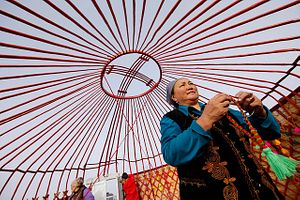The next few weeks in Kyrgyzstan are packed with notable events: the country’s 25th independence anniversary is August 31, the second World Nomad Games are September 3-8, and on September 17-18 the Commonwealth of Independent States will hold a summit in Bishkek. Kyrgyz President Almazbek Atambayev will celebrate his 60th birthday on the first day of the CIS summit and is expected to drop an album.
This series of events will draw international attention to the small, landlocked nation of 5.72 million. The World Nomad Games, in particular, will draw the kind of benign soft power attention most countries relish. The attention is much desired, especially when it comes with a potential boost to tourism in one of the region’s poorest states.
From all accounts the second World Nomad Games are set to be bigger and better than the 2014 iteration. The Games are being branded as nothing less than Eurasia’s Olympics–another useful analogy may be the Scottish Highland Games.
Organizers expect athletes from more than 50 countries to participate in the Games across 23 kinds of ethnosport: several kinds of wrestling and various equestrian events (including wrestling while on horseback), archery, traditional hunting, two kinds of Mancala-like games, and the ever-popular Kok Boru (known as Buzkashi in Afghanistan). Attendees are promised “grandiose opening and closing ceremonies” and a cultural festival in a nearby “picturesque gorge.”
Like the Olympics, the World Nomad Games seem to aim for an apolitical atmosphere, but may find it difficult to escape the seeping influence of politics.
Although there are at least twice as many countries participating in this year’s Games–including Guatemala, Estonia, and Zimbabwe–one of Kyrgyzstan’s own neighbors is notably absent from the attendee list.
Uzbekistan, which did participate in the inaugural World Nomad Games in 2014, hasn’t been listed as participating in this year’s edition (it’s possible they are, but their flag is absent from the official website). The Turkmen President, the CEO of Gazprom and Steven Seagal are all attending the opening ceremonies, but the Uzbeks look set to skip.
Relations between Uzbekistan and Kyrgyzstan have soured in 2016, flaring in March and then again in recent weeks. In March, Uzbekistan reportedly deployed two armored personnel carriers and 40 troops to a disputed mountain, Unkur-Too, on the Kyrgyz-Uzbek border. The mountain hosts a Kyrgyz government radio tower. Kyrgyzstan responded in kind, deploying its own troops. The border in the area was closed temporarily. After a few tense days, negotiators were dispatched, the CSTO was informed (by Kyrgyzstan, likely to irk the Uzbeks who left the organization in 2010), and the situation settled back to the usual simmer. Atambayev ultimately didn’t follow through with his threat to skip the June Shanghai Cooperation Organization summit in Tashkent.
The same mountain featured in the March tensions is again the site of problems. The Kyrgyz Border Service said Monday that seven Uzbek border guards landed via Mi-8 helicopter on Unkur-Too. At the same time, the Uzbeks imposed a temporary closure of the border–barring Kyrgyz from entering Uzbekistan and vice versa–ostensibly in the name of security ahead of Uzbekistan’s September 1 independence day. Then four Kyrgyz citizens were detained for being “illegally present in Uzbekistan.” As Anna Lelik detailed in a thorough report for EurasiaNet, the core issue is not the mountain, but a nearby reservoir–the ownership of which has become heavily politicized and was the subject of its own scandal last November.
Down in the Fergana Valley, Uzbekistan and Kyrgyzstan face off. It’s likely the present tensions–as in times before–will abate. But in cyclical fashion, we can bet on future flares on the edge of the valley. The core issues haven’t been comprehensively addressed—namely borders but perhaps more importantly water. (David Trilling has a short piece and accompanying photos up on Foreign Affairs regarding Central Asia’s water wars that can give more context.)
So, while the border simmers, the world will trek up to Issyk-Kul to celebrate the region’s nomadic history–a blessed time without the hard borders that are such a headache now.

































